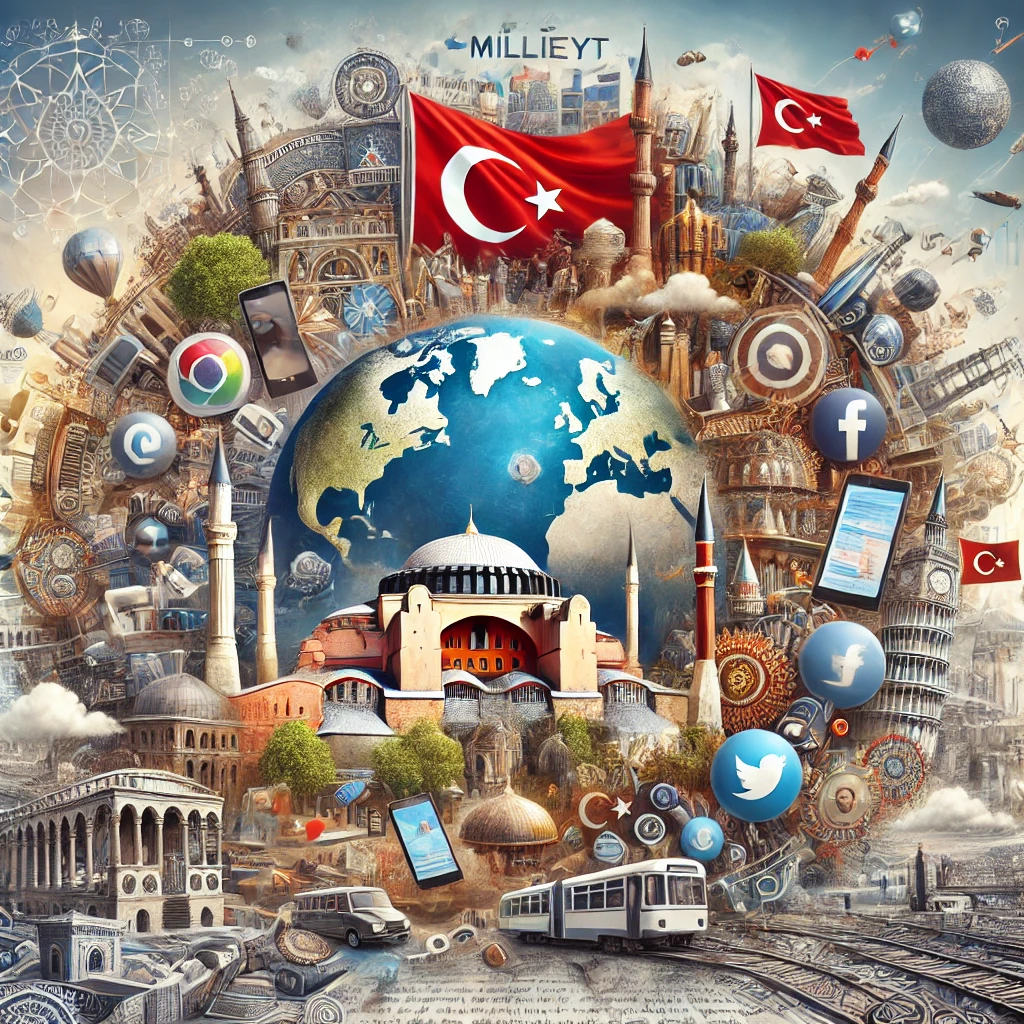Millieyt: The Global Impact and Evolution of Nationalism and Cultural Identity

Millieyt, a term originally grounded in Turkish nationalism, has evolved into a broader concept influencing movements across continents. This ideological force is not confined to Turkey alone but has played a crucial role in shaping the nationalistic sentiments in Europe, Asia, Africa, and the Americas. As an ideology, Millieyt’s emphasizes the importance of national sovereignty, unity, and the preservation of cultural identity, often promoting a balance between tradition and modernity. It has shaped economic policies, political governance, and social cohesion. But it has also faced significant criticisms for fostering exclusionary and divisive behaviors.
This article will explore the historical origins of Millieyt, its global interpretations, its influence on culture, politics, and economy, as well as the controversies surrounding it.
What is Millieyt?
At its core, Millieyt represents an ideology of nationalism that prioritizes the cultural, linguistic, and historical heritage of a nation. It advocates for self-sufficiency, unity, and a sense of pride in one’s country. In Turkey, the term became particularly significant during its quest for national independence. Has since been used as a rallying cry for unity and cultural pride.
However, the idea of Millieyt’s transcends Turkish borders. It has resonated with various nationalistic movements across the globe, influencing different countries and regions that seek to preserve their own unique cultural and historical identities in an increasingly globalized world.
The Pillars of Millieyt
- Cultural Pride: A strong emphasis on preserving and celebrating a nation’s culture and heritage.
- National Sovereignty: Prioritizing a nation’s independence and self-reliance in political, social, and economic matters.
- Unity: Fostering a collective national identity that binds people together despite internal differences.
- Balance Between Tradition and Modernity: Advocating for the preservation of national values while embracing modernity for national growth and advancement.
The Historical Evolution of Millieyt
Roots in Turkish Nationalism
Millieyt’s roots are deeply embedded in the nationalist movements that emerged during the decline of the Ottoman Empire. As the empire crumbled, Turkish intellectuals began advocating for a unified Turkish national identity. As opposed to the multicultural, multi-ethnic structure of the Ottoman state.
The term gained widespread prominence during Turkey’s War of Independence (1919-1923) under the leadership of Mustafa Kemal Atatürk. Atatürk’s vision of a modern, secular Turkish Republic was steeped in the ideals of Millieyt. He sought to create a homogeneous national identity rooted in Turkish culture and language. Atatürk’s reforms, from language policies to secularism. They were all part of a broader Millieyt’s agenda that prioritized national sovereignty and unity.
Global Adaptations
Though Millieyt’s was originally tied to Turkish nationalism, similar nationalist sentiments have emerged in various parts of the world, evolving according to regional contexts. In Europe, nationalism during the 19th century became a movement of cultural preservation and political sovereignty, especially in countries like Italy, Germany, and France. Romantic nationalism in these regions aimed to unify people around shared history, language, and culture.
In Asia, countries like India and Japan also adopted nationalist ideologies to strengthen their cultural and political identities during colonial and post-colonial periods. African nations, in their quest for independence from colonial powers, embraced similar ideals of cultural unity and sovereignty, integrating Millieyt-like nationalism into their movements for self-determination.
The Role of Technology
In the 21st century, the rise of digital platforms has transformed how Millieyt is perceived and shared. Social media has allowed younger generations to engage with nationalist ideologies, sometimes reshaping traditional narratives into more inclusive or democratic dialogues. In Turkey, for instance, Millieyt is often discussed not only through the lens of cultural pride but also through the role of nationalism in a globalized and digitized world.
Key Influencers and Figures
Pioneers of Millieyt
Several historical and political figures have been instrumental in shaping the ideals of Millieyt. Mustafa Kemal Atatürk is perhaps the most prominent figure, as his leadership during the Turkish War of Independence and subsequent nation-building efforts were strongly rooted in Millieyt ideals. His vision for a unified, modern Turkish state helped lay the foundation for how Millieyt would evolve within Turkey.
Other intellectuals, writers, and political leaders also played crucial roles in advancing the Millieyt agenda, not just in Turkey but across other regions. Their writings and political actions continue to influence nationalist movements globally.
Modern Thought Leaders
In the contemporary world, Millieyt continues to inspire nationalistic sentiment through political leaders, media figures, and academics who promote cultural preservation and national unity. As countries face the challenges of globalization, the principles of Millieyt—particularly those emphasizing national sovereignty—remain relevant.
The Cultural Impact of Millieyt
Influence on Language, Literature, and the Arts
One of the most visible aspects of Millieyt is its influence on language policies. Countries embracing Millieyt often prioritize the use of their native languages, aiming to preserve linguistic heritage as part of the broader goal of cultural preservation. In Turkey, Atatürk’s language reforms sought to replace Ottoman Turkish with a modernized version of the Turkish language, thus reinforcing national identity.
In the realm of literature and the arts, Millieyt has also had a profound impact. Many works of art, novels, and films have centered around themes of national pride, unity, and cultural heritage. These creative expressions have played a key role in fostering a sense of collective identity and belonging.
Social Cohesion and Identity
Millieyt promotes social cohesion by fostering a shared national identity. This collective identity can help strengthen ties among individuals within a nation, reducing internal divisions and fostering a sense of belonging. However, this cohesion can sometimes come at the cost of inclusivity, as Millieyt often struggles with balancing national unity with the diversity found within multicultural societies.
In diverse countries, the application of Millieyt can be more complex, as it requires carefully navigating ethnic, religious, and cultural differences while still promoting a unified national identity.

The Political and Economic Implications of Millieyt
Government Policies
Millieyt-driven governments often prioritize national interests, particularly in areas such as education, cultural preservation, and economic policies. These governments implement policies that promote national unity and cultural pride, often placing an emphasis on teaching national history and values in schools.
Millieyt also has an economic dimension, with many nationalist movements advocating for policies that protect domestic industries and promote self-sufficiency. Countries embracing Millieyt often focus on reducing their reliance on imports, supporting homegrown industries, and enacting trade regulations to protect local economies.
Economic Nationalism
Economic nationalism is a core aspect of Millieyt, particularly in its emphasis on protecting local industries from international competition. Countries adopting Millieyt-driven economic policies tend to prioritize domestic production, impose trade barriers, and seek to become more self-sufficient. This approach, while promoting national sovereignty, can sometimes lead to tensions in global trade relations, as countries adopt protectionist measures.
Political Nationalism
Politically, Millieyt’s has influenced governance structures in various nations, encouraging policies that prioritize national sovereignty and cultural identity. In many countries, this form of nationalism is used to rally citizens behind national leaders and political movements, creating a sense of unity and purpose. However, this can also lead to exclusionary politics, where minority groups may feel alienated or marginalized.
Controversies and Criticisms of Millieyt
Exclusionary Nationalism
While Millieyt is often praised for promoting national unity and pride, it has faced significant criticism for being exclusionary. Critics argue that the narrow focus on a singular national identity can alienate minority groups within a country, leading to social division and tension. In Turkey, for example, Millieyt has been criticized for promoting a vision of Turkish identity that excludes ethnic and religious minorities, such as Kurds and Armenians.
Nationalism vs. Globalism
In an increasingly globalized world, Millieyt’s emphasis on national sovereignty can sometimes clash with globalist ideals that promote cooperation and collaboration across borders. This has led to debates about the role of nationalism in a globalized economy and whether Millieyt-driven policies hinder or help a country’s growth and development.

The Future of Millieyt
Globalization and Technology
As the world becomes more interconnected through globalization and digital technology, the principles of Millieyt will continue to evolve. On one hand, globalization can erode national identities as cultural influences and economic interdependencies blur borders. On the other hand, technology has also made it easier for nationalistic ideas to spread and evolve, especially among younger generations who engage with Millieyt through social media and other digital platforms.
Balancing Tradition and Modernity
The future of Millieyt will likely hinge on how well countries can balance the preservation of national traditions with the demands of modernity. As technological advancements and global challenges, such as migration and climate change, shape the world, Millieyt will need to adapt to remain relevant in the 21st century.
Read Also: çeciir: Unveiling the Rich Tapestry of Turkish Culinary Heritage
Conclusion
Millieyt, as both an ideology and a movement, has played a profound role in shaping national identity, politics, and culture across the globe. From its origins in Turkish nationalism to its modern adaptations in various regions, Millieyt has had a lasting impact on how nations perceive themselves and interact with the world. While its emphasis on national pride and sovereignty continues to resonate, it is not without its controversies, particularly regarding its exclusionary tendencies and its challenges in a globalized world. As nations navigate these complexities, the ideals of Millieyt will continue to evolve, shaping the future of national and global identities.
FAQs
What is Millieyt?
Millieyt is a concept centered around national pride, cultural preservation, and sovereignty. It promotes unity by emphasizing a shared national identity based on history, language, and traditions.
2. Where did Millieyt originate?
Millieyt originated in Turkey during the late Ottoman Empire. It became prominent in the early 20th century as a response to the empire’s collapse, with Mustafa Kemal Atatürk playing a significant role in shaping its ideals.
3. How does Millieyt affect culture?
Millieyt’s influences national language policies, education, and cultural preservation. It encourages the celebration of national traditions while fostering a sense of social unity and identity.
4. What are the political implications of Millieyt?
Politically, Millieyt’s promotes national sovereignty, economic independence, and policies that prioritize local interests. It often shapes government decisions in education, trade, and cultural affairs.
5. What are the criticisms of Millieyt?
Millieyt’s has been criticized for being exclusionary, sometimes marginalizing minority groups. Critics argue that its focus on a singular national identity can lead to social divisions and hinder inclusivity.





